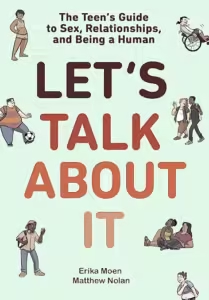Let’s Talk About It: The Teen’s Guide to Sex, Relationships, and Being a Human
Erika Moen and Matthew Nolan
Random House Graphic
Published March 9, 2021
Amazon | Bookshop | Goodreads
About Let’s Talk About It
An inclusive, accessible and honest graphic novel guide to growing up, from gender and sexuality to consent and safe sex. Perfect for any teen starting to ask…Is what I’m feeling normal? Is what my body is doing normal? Am I normal? How do I know what are the right choices to make? How do I fix it when I make a mistake?
Let’s talk about it.
Growing up is complicated.
How do you find the answers to all the questions you have about yourself, about your identity, and about your body? Let’s Talk About It provides a comprehensive, thoughtful, well-researched graphic novel guide to everything you need to know but might not know how to talk about.
Covering relationships, friendships, gender, sexuality, anatomy, body image, safe sex, sexting, jealousy, rejection, sex education, and more, this is the go-to handbook for every teen navigating adolescence, and the first in graphic novel form.
My Review
Growing up is complicated. Whew.
This book covers a lot of ground, so I’ve been struggling with how to write my review. I like that it tackles a wide range of topics in a conversational, relaxed way that normalizes having questions and seeking safe places to find answers to those questions, whether from an older mentor, sibling, or more experienced friend.
Each chapter centers around a specific topic, such as body image, safe sex, or aftercare. Some chapters have explicit content, while others do not. For example, the chapter on body image shows some cartoon images of characters in their underwear or naked. These illustrations support the points in the text. For instance, in the body image chapter, the characters represent different races, body sizes, and genders.
The information stays fairly basic. Each chapter is only about 13 pages long, and the pages are graphic novel panels, so the text is broken up by images, and some lines appear in speech bubbles.
Topics Overview
I like that the information is pretty basic. It offers readers a great place to begin with some of these topics. I also like that the book covers topics like what happens to friendships or how to maintain friendships while dating. It explores what to do with feelings of jealousy or rejection. There’s an infographic that helps readers identify an abusive partner or recognize abusive behavior patterns in themselves.
Illustrations show an inclusive group of teens, including teens of different races, disabled teens, and intersex/transgender teens.
Some chapters explore topics that will leave some parents squirming. This is stuff that a lot of us probably leave out of our explanations about intimate relationships, but these are topics that teens will probably have questions about, and it’s important to create safe spaces to find information.
Here are some of the more sex-specific topics covered: gender/sexual identity, body image, anatomy, masturbation, contraceptives and protection, climax, sexting (including safety concerns), and aftercare.
There is also a chapter about kinks, fantasies, and porn. It introduces what each topic means and encourages communication and safety between partners.
More Context Desired
A few things in the book would benefit from additional context or further conversation. I think that’s intentional. This book isn’t meant to answer every question or cover every scenario. It’s more of a guide to the basics or a conversation opener. One of the things I wish had more context, for example, is that on one page, the text encourages readers that the internet is a safe place to search for information about sex.
I mean, yeah, it’s safe from the standpoint that Google isn’t going to call you homophobic slurs because of your search terms. But there are internet viruses and other risks to be careful about. Sometimes what seems like innocent enough search terms can return results that are way more explicit than the user intended. I wish the text had at least encouraged thoughtfulness or included some parameters for search terms and basic virus avoidance or something.
Conclusion
Let’s Talk About It is one of the top ten most challenged books from 2023. If you follow book-ban conversations at all, it’s probably not hard to imagine why this one raises discomfort for some parents.
Kids need safe places to ask questions and gain information, though. I love the conversational style that the authors use in this book. I like that they keep information pretty basic and that they encourage safety and communication above all.
Perhaps some of these topics wouldn’t be so scary or uncomfortable for us to think about our kids reading if we were better at safe communication ourselves.
Content Notes
Recommended for Ages 16 up.
Profanity/Crude Language Content
F-bombs appear somewhat infrequently.
Romance/Sexual Content
Cartoon illustrations show simple nude figures of different genders. Illustrations show kissing between characters. One simple illustration shows two people engaged in sex. Illustrated diagrams show sexual organs. A chart lists contraceptive options and their effectiveness. One chapter discusses pornography. Another talks about masturbation. In another, a couple share secret fetishes or fantasies with one another (readers are not privy to the details).
Spiritual Content
None.
Violent Content
One section explains what consent is and is not. An infographic lists abusive behavior patterns one might recognize in oneself. Another shows behavior abusive behavior patterns one might recognize in a partner.
Drug Content
In the section discussing what consent is not, one panel shows someone unconscious and states that someone who is sleeping or inebriated cannot give consent.
Note: This post contains affiliate links, which do not cost you anything to use but help support this blog. All opinions are my own.
